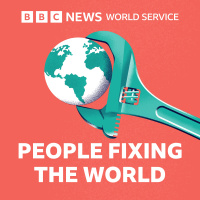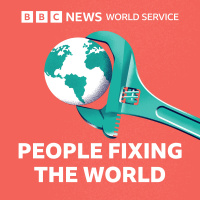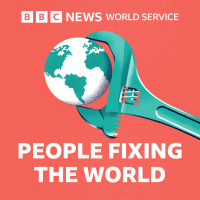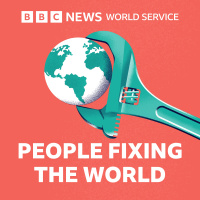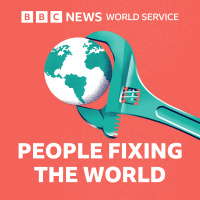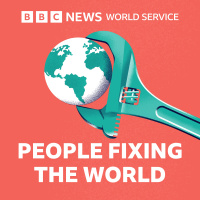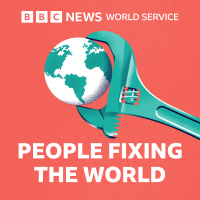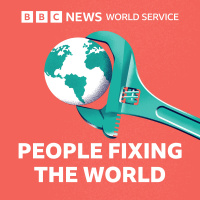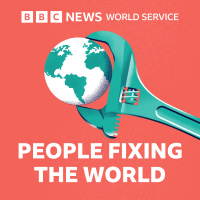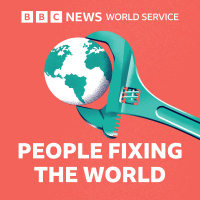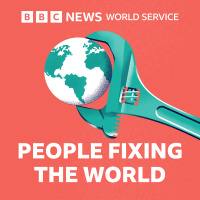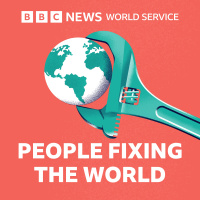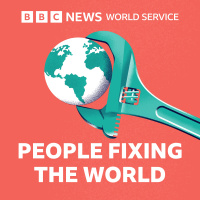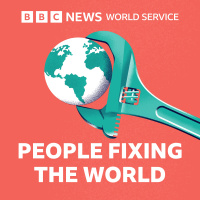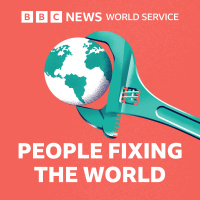Sinopsis
Brilliant solutions to the worlds problems. We meet people with ideas to make the world a better place and investigate whether they work.
Episodios
-
Problem-Solving Prizes
17/04/2018 Duración: 23minPeople can’t resist a prize, especially when there’s money to go with a medal, and for hundreds of years that basic human urge has been used to push humanity forward. When you focus minds and money towards a simple target, incredible things can happen - from the clock that won the Longitude prize money in the 1700s to the spacecraft that won the XPRIZE in 2004. Are there any problems that a big enough prize cannot solve?Producer & Reporter: William KremerPhoto Caption: Pilot Mike Melvill standing on Space Ship One, which went on to win the Ansari XPRIZE Photo Credit: Getty Images This programme uses a sound effect created by Freesound user bone666138Correction: Since our interview with Marcus Shingles was recorded, he has stepped down as CEO of XPrize
-
The Town Trying to Cure Loneliness
10/04/2018 Duración: 23minLoneliness and isolation can trigger a host of other problems, particularly for our health. But a town in Somerset, in the United Kingdom, appears to have taken a big step towards alleviating the problem. A team in Frome has implemented a handful of simple ideas – getting people to talk about the problems they face and finding ways for them to re-engage with family, friends or social clubs – and they believe it is having a dramatic effect. The cost of emergency admissions in Frome has fallen steeply, while it rises across most of the UK. We visit the town to meet the ‘connectors’ driving the project, and the people they have helped.Presenter: Nick HollandPhoto caption: Susan Redding Photo credit: BBC
-
The Babies Teaching Kindness In Class [REPEAT]
02/04/2018 Duración: 23min**This episode is a repeat from 23 January 2018**Naomi is not your average teacher. For one thing, she is only six months old. But in many schools across Canada babies like Naomi are a regular feature at the front of class. It is because of an education programme called Roots of Empathy, which is designed to encourage kids to be kinder. The idea is that because a baby cannot explain and externalise how it is feeling, children learn to recognise and identify the baby’s emotions, and become more emotionally astute themselves. It has been proven to reduce bullying. People Fixing the World visits a school in Toronto to see how it works.Reporter: Harriet Noble Presenter: Tom CollsPhoto Caption: Baby Naomi Photo Credit: BBC
-
Taking Out the Space Trash
27/03/2018 Duración: 23minSpace is littered with junk – some pieces as small as a fleck of paint, and some as large as a London bus. So much of it is orbiting the Earth, in fact, that it poses a danger to future missions. But how can space be cleaned up? One way could be to catch the junk in a net, or to use a harpoon to grab it. A team in Surrey, in the UK, are launching a special spacecraft to find all of this out. Reporter: Nick Holland Presenter: Dougal ShawImage: Stock illustration of space debris Credit: Getty Images
-
How to Help Homeless People in Hospital
20/03/2018 Duración: 22minBeing homeless is extremely bad for your health. Homeless people end up in hospital far more often, and when they get there their condition is often serious. We visit a London hospital to see how one innovative healthcare charity is rethinking caring for the homeless – and how a hospital visit can be an opportunity to do far more than just patch a patient up and send them on their way. Presenter: Tallulah Berry Reporter: Tom Colls Producer: Ammar EbrahimImage: Gary Spall (BBC)
-
The Bird Rescuers
13/03/2018 Duración: 23minOne of every five bird species could be extinct within the next century. Whether it’s down to the shiny glass office blocks materialising all over cities or the trawlers sailing ever-further out to sea to feed our growing population, our birds are seriously under threat. This episode looks at two particular successes when it comes to helping the world’s feathered friends: how Toronto has become a world leader in making cities bird-friendly, and how a group of enterprising conservationists has almost eliminated the deaths of albatrosses as a result of deep-sea fishing.Presenter: Tom Collls Producer: Harriet NobleImage: Pair of albatrosses Credit: ShutterstockCORRECTION: In this programme we say that two buildings in Toronto where bird collisions were high lost court cases and had to be adapted. In fact they did not lose the court cases. The charges were dismissed but as a result of the trial bird-safe markers were applied to sections of the buildings.
-
Recycling Chewing Gum Litter to Clean Our Streets
06/03/2018 Duración: 23minMore than $20bn is spent on chewing gum around the world each year. A lot of that gum will end up stuck to the streets. That's why gum is the second most common kind of street litter after cigarette materials. In the UK councils spend around £50m each year cleaning up the mess. But British designer Anna Bullus had an idea - what if the sticky stuff could actually be recycled and turned into useful objects? Presenter: Harriet Noble Reporter: Dougal ShawPhoto caption: Shoe sole made of chewing gum Photo credit: BBC
-
How to Talk to Potential Extremists
27/02/2018 Duración: 23minSocial media and messaging apps play a role in the extremist “radicalisation” of individuals. Tech companies have tried to get better at identifying extremist content and taking it down, but some specialists advocate an alternative approach – to use these platforms to engage with extremists one-to-one, to confront them and talk them round.Last year, the Institute for Strategic Dialogue in London organised hundreds of conversations on Facebook messenger between activists and those expressing extreme Islamist and far-right sympathies. World Hacks has been given exclusive access to their report.This experiment raises many moral and practical questions. Do those posting extreme views online still have a right to privacy? At what point do we judge someone as suitable for this kind of intervention? And what exactly is the best way to start a conversation with an extremist?Presenter: Elizabeth Davies Producer: William KremerPhoto credit: Colin Bidwell (BBC)CORRECTION: In this programme, we say that counter-conversat
-
Putting Forgotten Pills Back to Work
20/02/2018 Duración: 23minAn app in Greece is helping people donate their leftover drugs to people who can't afford to buy them. So far the system has helped to recover and redistribute 13,000 boxes of medicine. Donors use the software to scan a unique code on the side of their boxes of unwanted drugs. The app automatically uploads details of the medication to a central database. They're then taken in by the country's network of social pharmacies where they're then given out to unemployed and homeless people.Reporter: Nick Holland Presenter: Harriet Noble
-
Improvising Your Way Out of Anxiety
13/02/2018 Duración: 22minYou’re standing on a stage, blinded by a spotlight trained on your face, knees weak, hands sweaty. Someone from the audience calls out a random word and you have to immediately react and come up with an amusing sketch or skit. This is improv, the unscripted theatre form that seems like it would cause rather than cure anxiety. But across North America people with the mental health condition are signing up for special “Improv for Anxiety” courses where the techniques and practices of the stage art are used to boost confidence. Producer: Harriet Noble Presenter: Tom Colls Photo Credit: BBC
-
The Hydroponics Revolution
06/02/2018 Duración: 23minProviding food for seven billion people is fraught with difficulty. Fertilising vast tracts of land and flying fresh vegetables across the globe comes at a huge environmental cost. But more and more people are turning to hydroponics - growing plants in water, without any soil. The idea itself is hundreds of years old, but new twists on the old technique are now shaping the future of food. We investigate some of the most innovative hydroponics projects, from the refugees growing barley for their goats in the Algerian desert to the underground farm built in an abandoned London bomb shelter. But how efficient can the process become? Can hydroponics begin to offer a serious alternative to conventional farming?Presenter: Harriet Noble Photo credit: Shutterstock
-
The Currency Based on Good Deeds
30/01/2018 Duración: 23minBy its very nature, volunteering means you don’t get paid. But what if there was a way to compensate volunteers that also helped the local economy? The northern English city of Hull is trying an experiment with a new, local cryptocurrency called HullCoin - the first of its kind in the world. It’s a sort of community loyalty scheme, that can only be earned by doing ‘good deeds’ and can only be redeemed in local businesses. But can it really improve the economic resilience of struggling industrial cities? World Hacks has been to Hull to find out.Presenter: Dougal Shaw Reporter: Elizabeth Davies Photo Credit: BBC
-
The Babies Teaching Kindness in Class
23/01/2018 Duración: 22minNaomi is not your average teacher. For one thing, she is only six months old. But in many schools across Canada babies like Naomi are a regular feature at the front of class. It is because of an education programme called Roots of Empathy, which is designed to encourage kids to be kinder. The idea is that because a baby cannot explain and externalise how it is feeling, children learn to recognise and identify the baby’s emotions, and become more emotionally astute themselves. It has been proven to reduce bullying. World Hacks visits a school in Toronto to see how it works.Reporter: Harriet Noble Producer: Elizabeth Davies(Photo: Naomi)
-
Kids versus Cars
16/01/2018 Duración: 23minAn English woman has championed a way to bring back community spirit to city streets and keep children fit. She creates pop-up playgrounds by regularly closing the roads to cars. Alice Ferguson began her project in Bristol and the idea is spreading around the UK. It is part of a much larger, global movement that thinks it can give children a better deal.
-
Can We Save Coral?
09/01/2018 Duración: 22minUp to 90% of the world’s coral could be dead by 2050, according to some estimates, unless we take radical action.Tackling climate change remains the central battle, but around the world scientists are working on projects that may give coral a greater chance of survival, or at least buy it some time.The World Hacks team investigates ‘super coral’ in Hawaii, an innovative insurance policy in Cancun, Mexico and a highly controversial plan to geo-engineer clouds above the Great Barrier Reef in Australia.Can any of these schemes transform the fortune of this endangered ecosystem? Presenter: Sofia Bettiza
-
Checking-in With The Problem Solvers
02/01/2018 Duración: 26minWorld Hacks follows up on some of our stories from last year – going back to innovators around to world to see how their projects have developed. We hear updates on the app that lets volunteers donate their vision to blind people, the man making roads out of plastic and the compost toilets in Haiti that are turning human waste into soil.Presenters: Harriet Noble and Dougal Shaw Reporters: Amelia Martyn-Hemphill and Nick HollandImage: People Fixing the World illustration / Credit: BBC
-
Scouts, Knives and a Community Fridge
26/12/2017 Duración: 23minThis week we hear about three small solutions trying to make a dent on some big problems. We hear about an outdoor gym made from melted-down knives. We talk to the scout leaders in Madagascar trying to break taboos around periods. And in London we visit the community fridge, where locals can donate and take whatever they want.Reporters: Amelia Martyn-Hemphill, Clare Spencer and Harriet Noble Presenter: Tom CollsImage: The Steel Warrior gym / Credit: BBC
-
The Ring That Could Help Save Women’s Lives
19/12/2017 Duración: 23minIn Southern Africa, over seven thousand women are infected with HIV each week. Many can't persuade their partners to wear a condom, so a new form of protection being tested in Malawi could be a real game-changer. It's a small silicon ring which encircles the cervix and releases antiretroviral drugs, lowering the women’s risk of contracting HIV. Their partners can’t feel it, and don’t even need to know it’s there. World Hacks meets the women pioneering this approach and taking control of their own protection.Presenter: India Rakusen Reporter: Ruth EvansImage: A community health nurse in Malawi holds up the dapivirine ring / Credit: BBC
-
How to Get Wheelchairs on Planes
12/12/2017 Duración: 23minIf you are a wheelchair user, travelling by aeroplane can be very difficult. Buses, trains and some cars are designed for people to roll into without getting out of their chair, but planes are not, which means an often painful process of moving between the chair and the airline seat – if this is even possible. This can potentially lead to injuries and can stop disabled people travelling by air.Now, a small group of amateur campaigners is trying to change this – designing and testing their own systems that would let their loved-ones travel the world in safety and comfort.Presenter: Harriet Noble Reporter: William KremerImage: Wheelchair crash testing / Credit: Michele Erwin
-
Drone Delivery: Medicines By Air
05/12/2017 Duración: 23minMost Malawians live in rural areas and if they get sick, it can be incredibly difficult to get testing kits or medicines in time. Malawi's government has now opened up part of its sky to companies and charities who want to use drones to solve this problem, creating what’s being called the world’s first humanitarian drone testing corridor. World Hacks travels to rural Malawi to assess the opportunities and dangers from this new technology, and to see how much Malawians could benefit.Image: Villagers in rural Malawi look on as a drone carrying medical supplies is unloaded / Credit: BBC
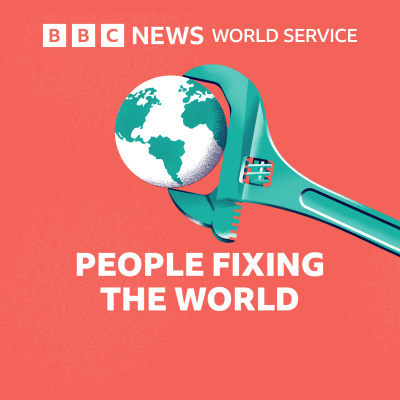
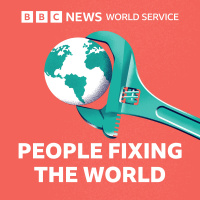
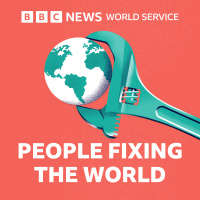
![The Babies Teaching Kindness In Class [REPEAT]](http://media3.ubook.com/catalog/book-cover-image/380799/200x200/9A32359E-D5B6-7E14-28CC-7C005AA4CB7E.jpg)
